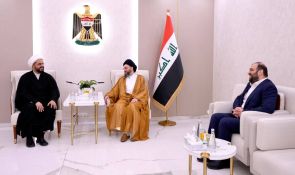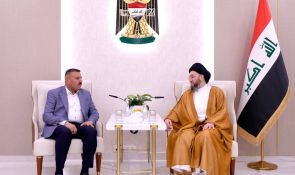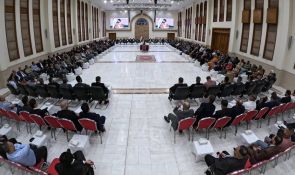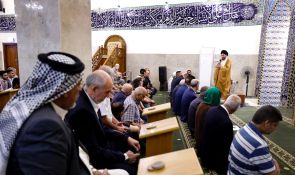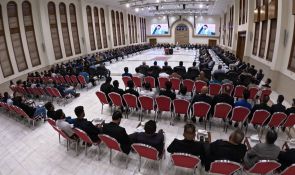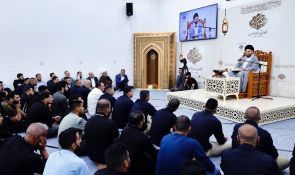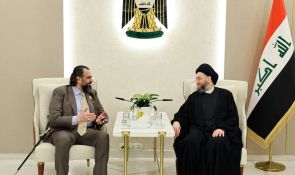Sayyid Ammar al-Hakim said, “The revolution of Imam al-Hussain (Ú) proved throughout history that it is loyal to all the goals and slogans it raised.”
Sayyid Ammar al-Hakim, Head of the Islamic Supreme Council of Iraq (ISCI), explained that Imam al-Hussain (Ú) and the Taff Battle are not history we read but a reality we live, stressing that the success of the missionary task is that we turn the Hussaini issue a reality lived by people and not a historic narrative that brings back sentiments, emotions and events.
This came up during his speech at the 22nd National Conference of Muballighs (Muslim missionaries) which was held in the Najaf al-Ashraf governorate on Thursday, November 8, 2012 and attended by representatives of the senior religious authorities as well as a large crowd of thousands of male and female Muslim missionaries from all over Iraq.
His Eminence pointed out to the significance of employing the sentimental dimension in creating a real vision about the revolution of Imam al-Hussain, stressing the investing of weeping and of shedding tears on Imam al-Hussain (Ú) in the process of mobilizing the human feelings and deriving lessons and morals. He drew attention to the revolution of Imam al-Hussain (Ú) having had great goals, and that it proved throughout history that it is loyal to all the goals which it released and the slogans which it raised. He added saying, “If we talk about an Arab Spring, the roots of this change was in al-Hussain’s Kerbala and in the life story of Imam al-Hussain (Ú).” He explained that extremism, terrorism, violence, beheading, part mutilation, taking sanctities lightly and assaulting others have been clear in the behavior of the enemies of Imam al-Hussain (Ú).
His Eminence also explained that the message of Imam al-Hussain (Ú) represents a comprehensive message, that all age groups and social segments were open to the Kerbala message, absorbing and incorporating them in one direction, that the issue of Imam al-Hussain (Ú) is that of man in all ages, centuries and positions, explaining that the camp of Imam al-Hussain (Ú) appeared in the clearest, most obvious and deepest human image which any human can manifest, one who bears the plan of the heavens, whereas the other camp clearly included values of meanness, baseness, extremism, intolerance, violence and the abandonment of the human values. His Eminence stressed the necessity for the missionary to talk about the matters which the citizen needs, about general interests, while ignoring the fact that these interests are wrapped with any religious, political or social label, stressing the necessity of looking after the youths and their role in firming virtue, reform and goodness in the society. He explained the big responsibility of the male and female missionaries in familiarizing others with the citizens’ rights, especially the active participation in the upcoming elections and in choosing those who are competent and sincere.


